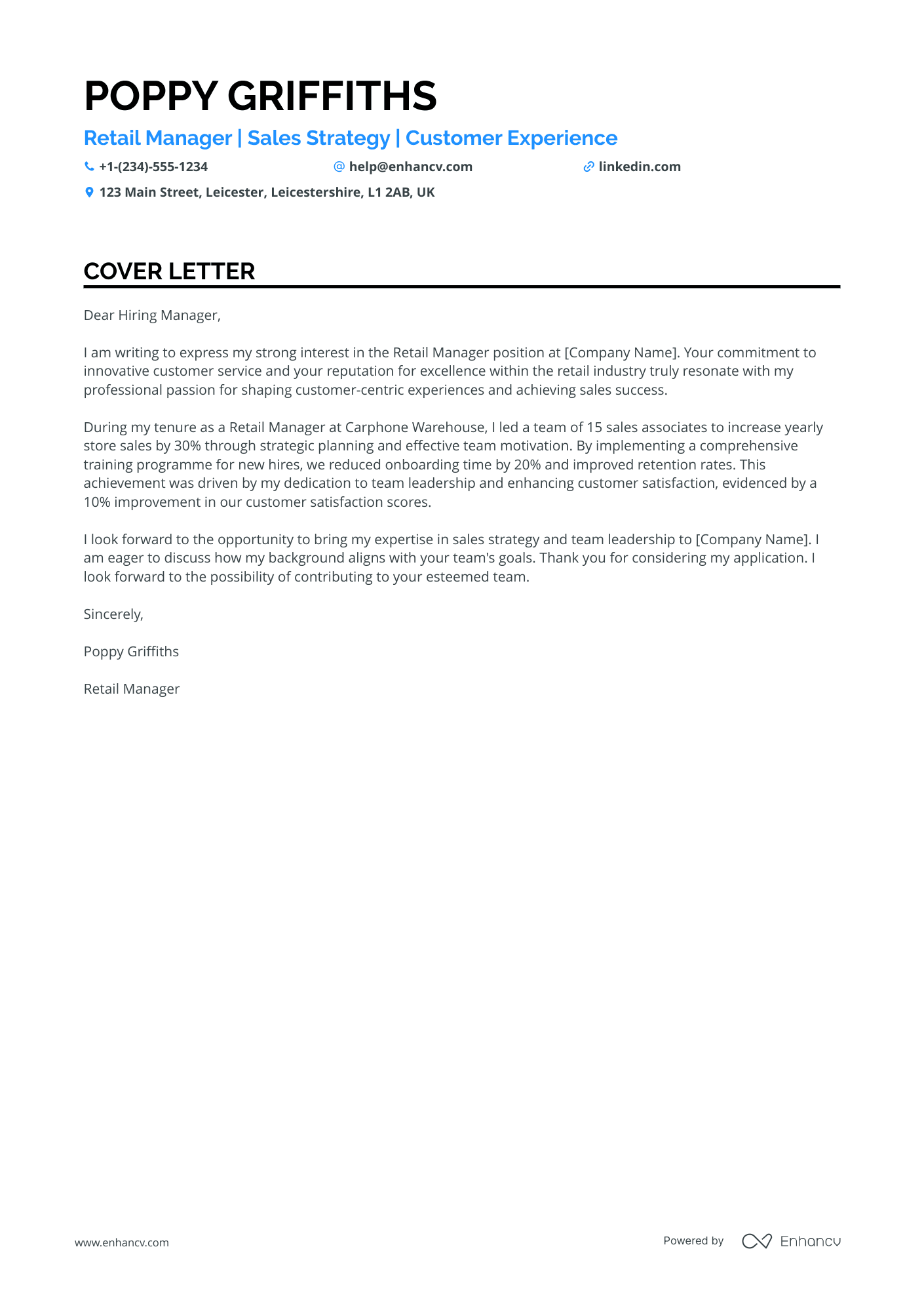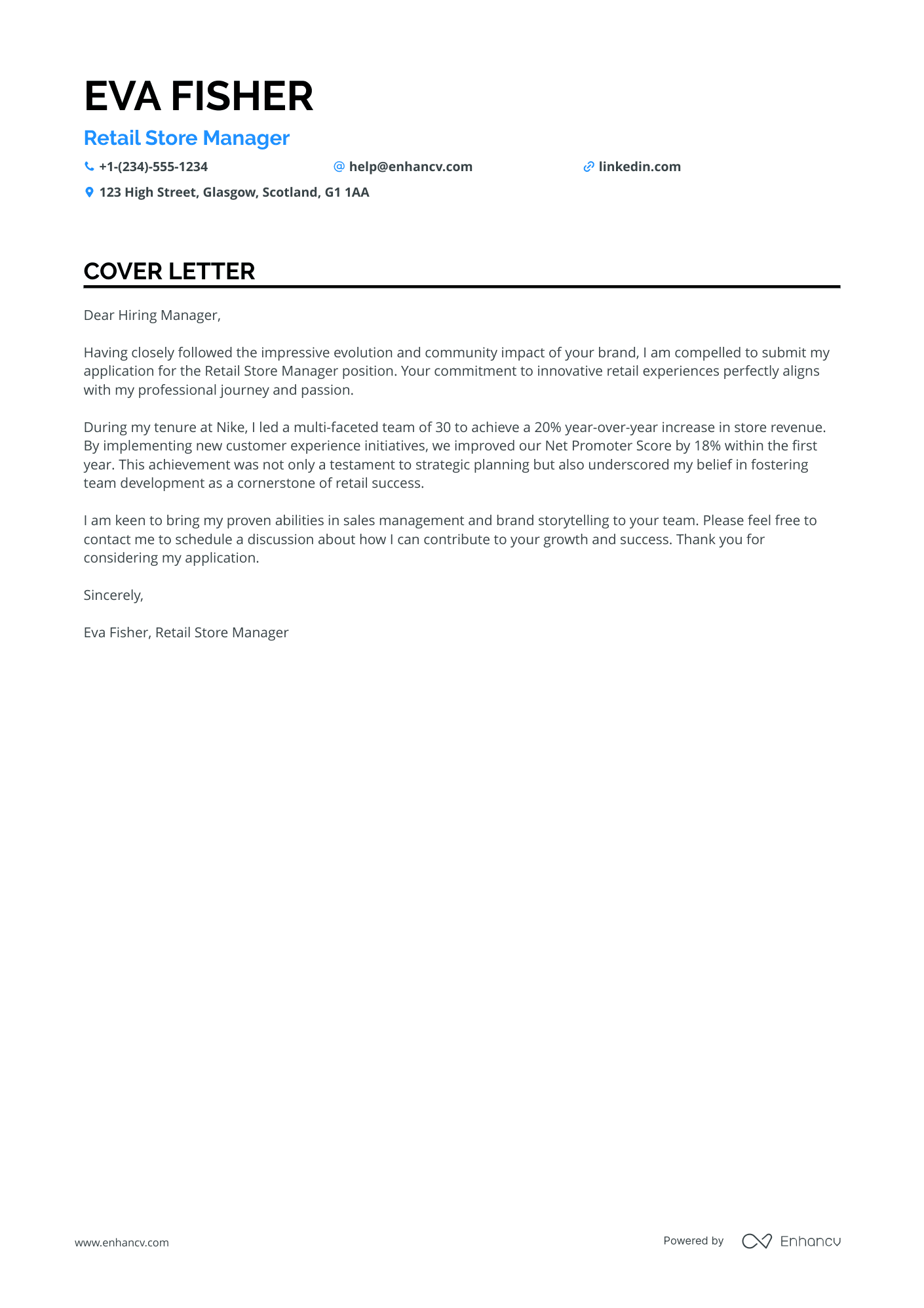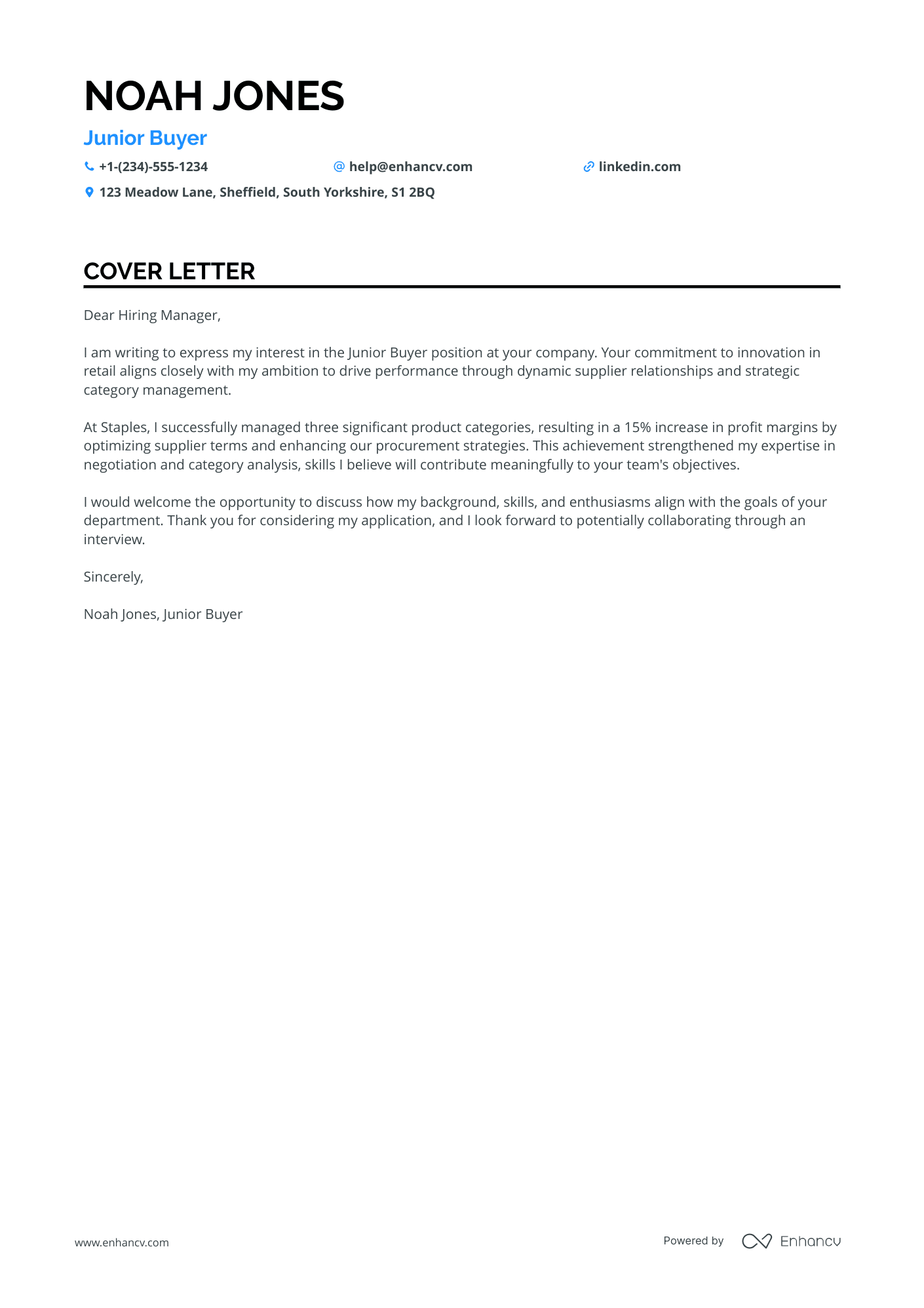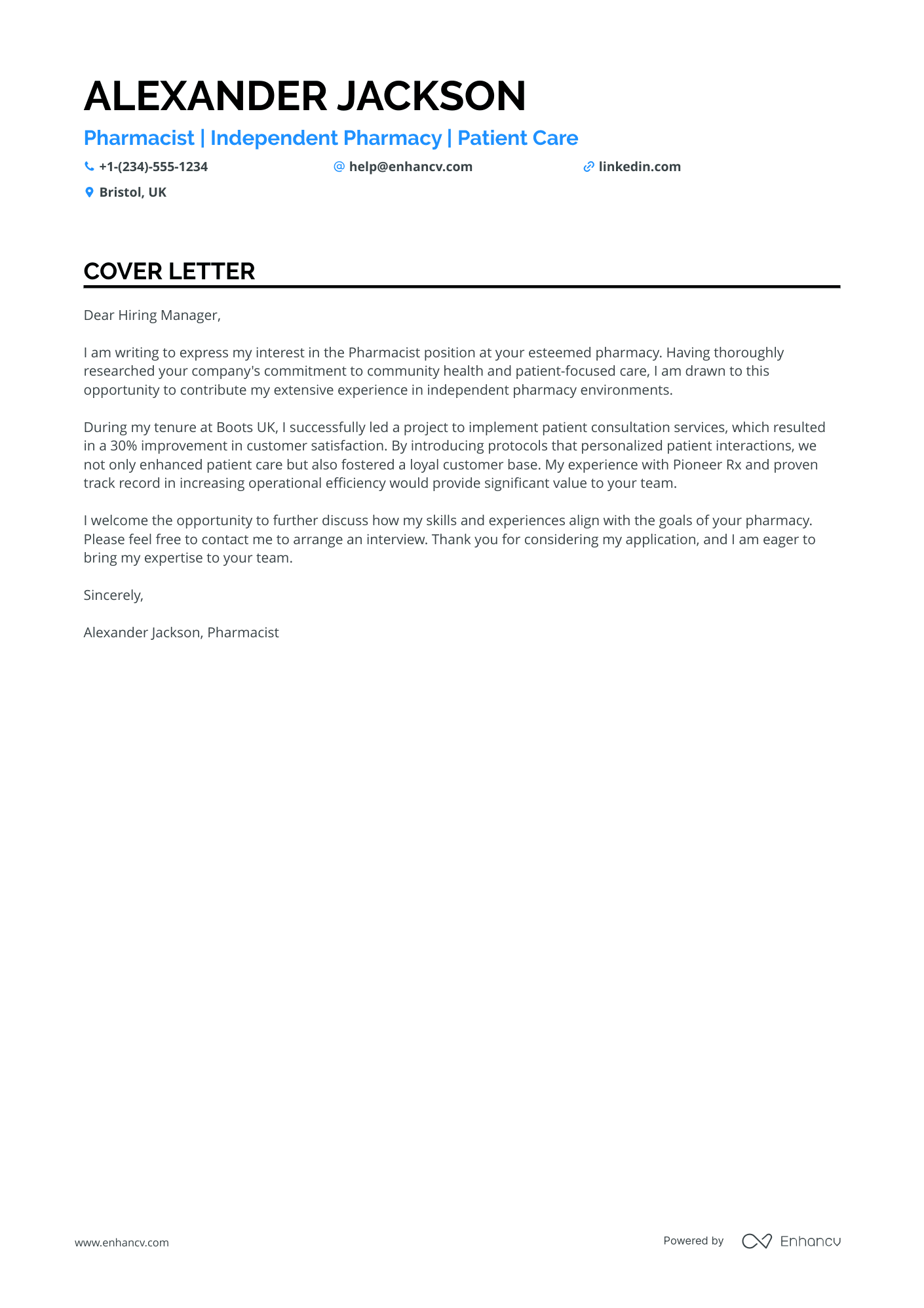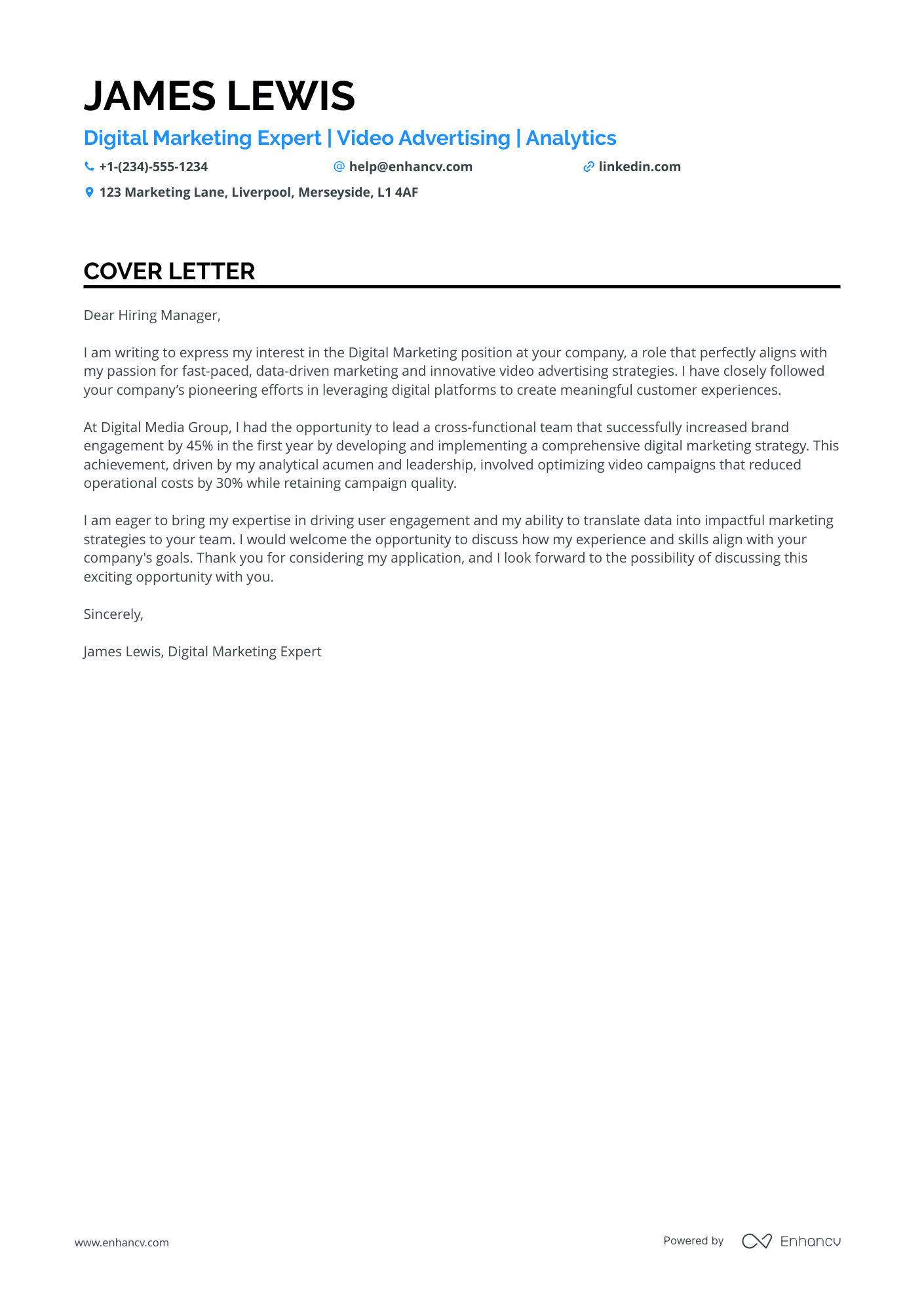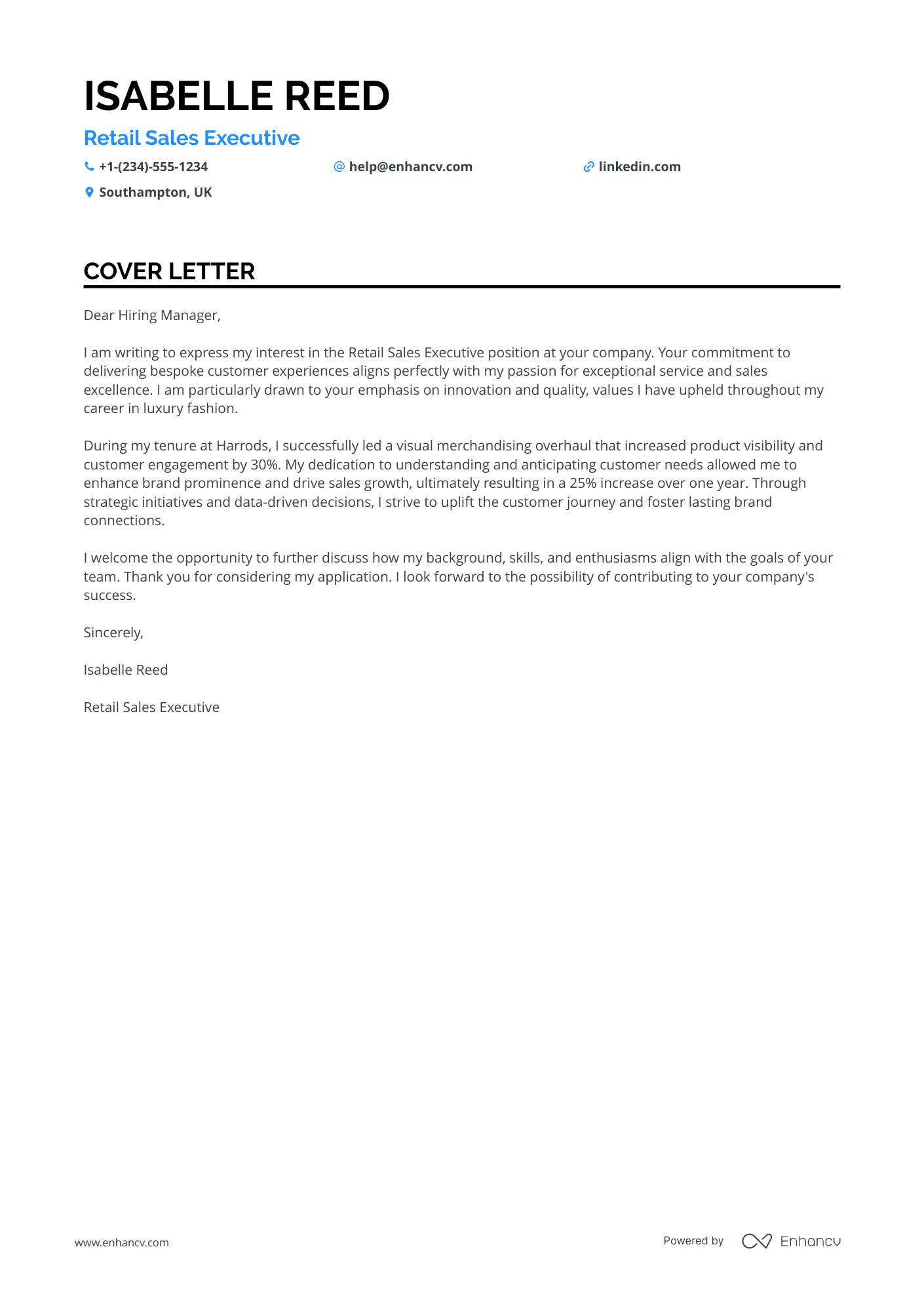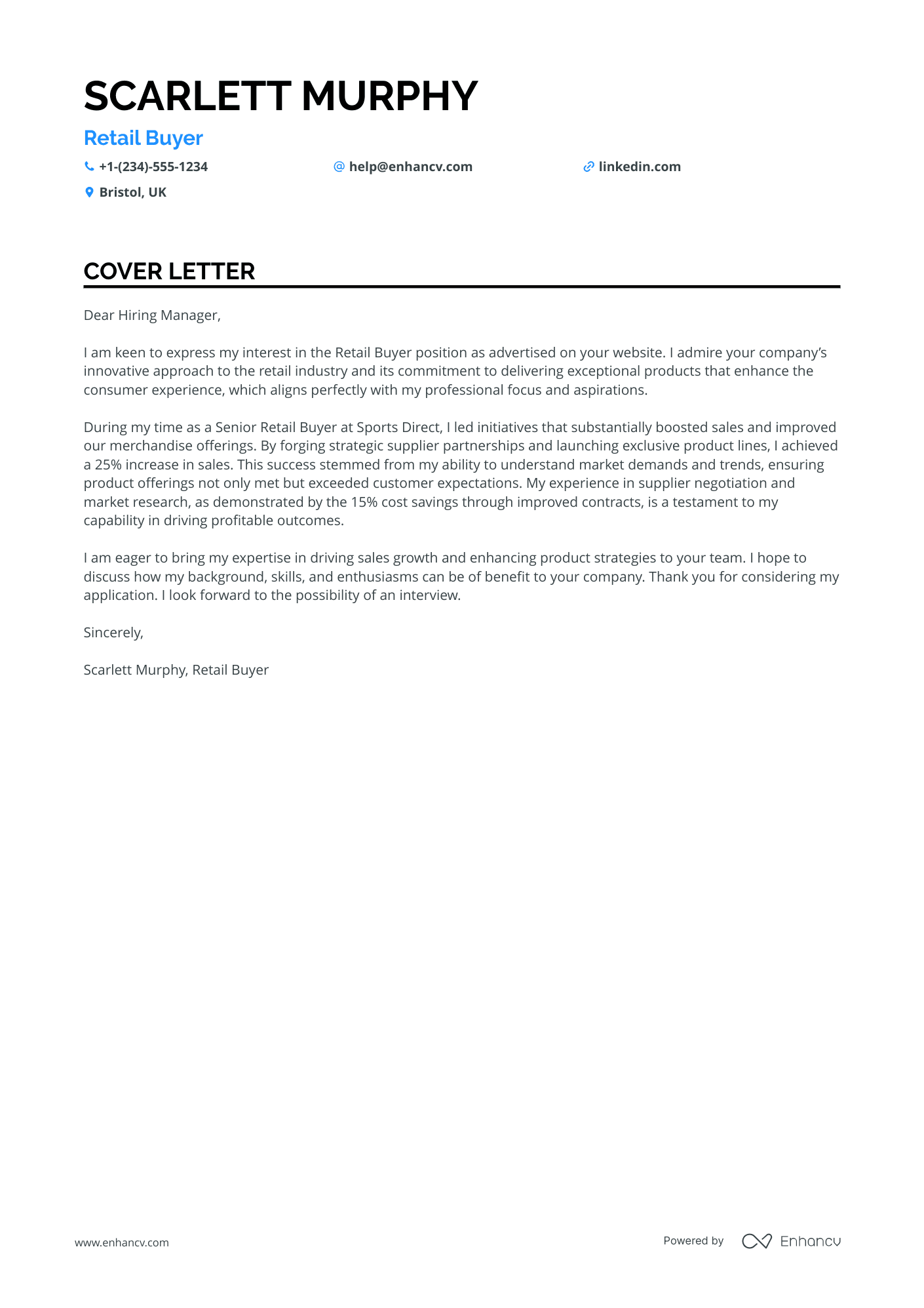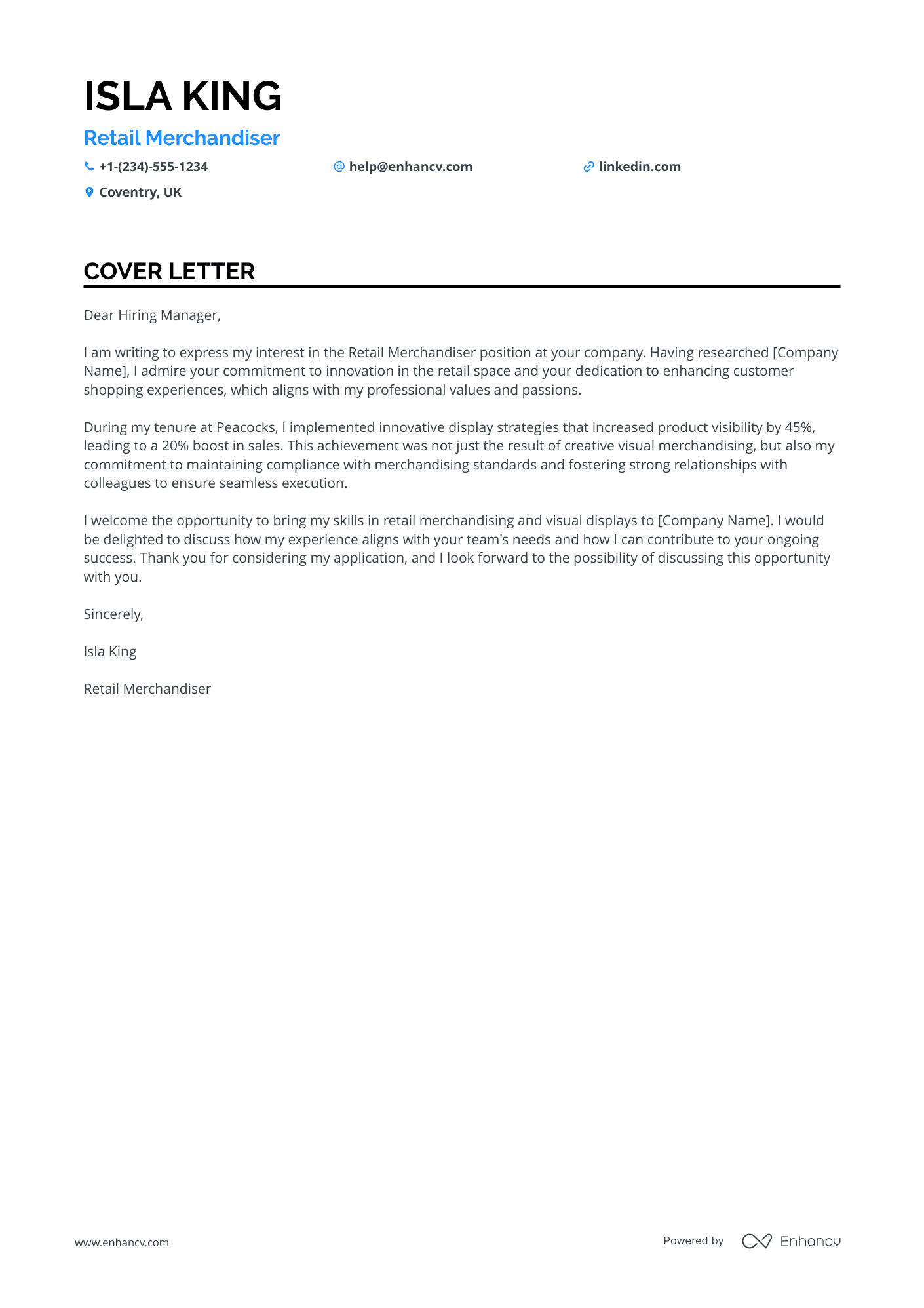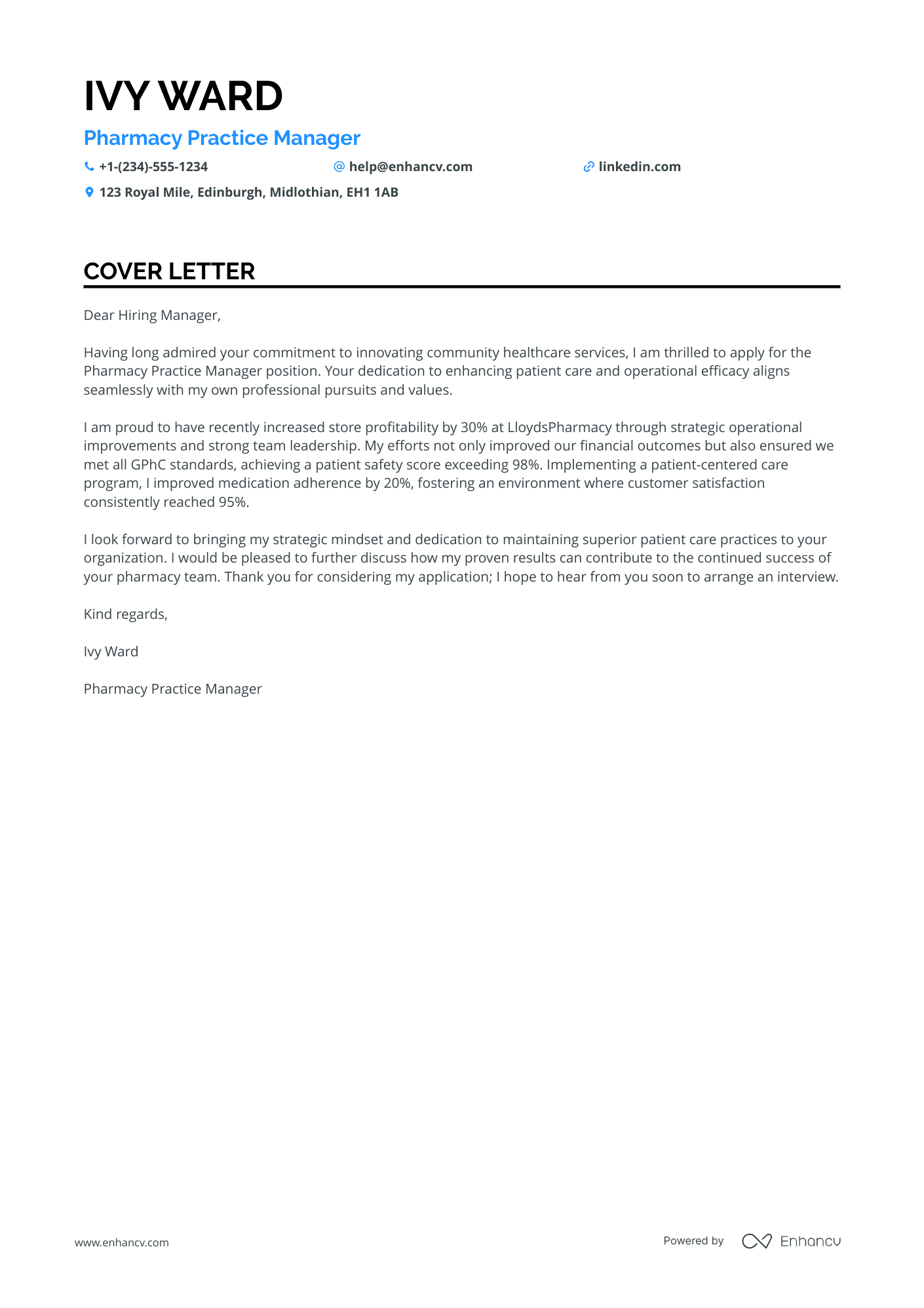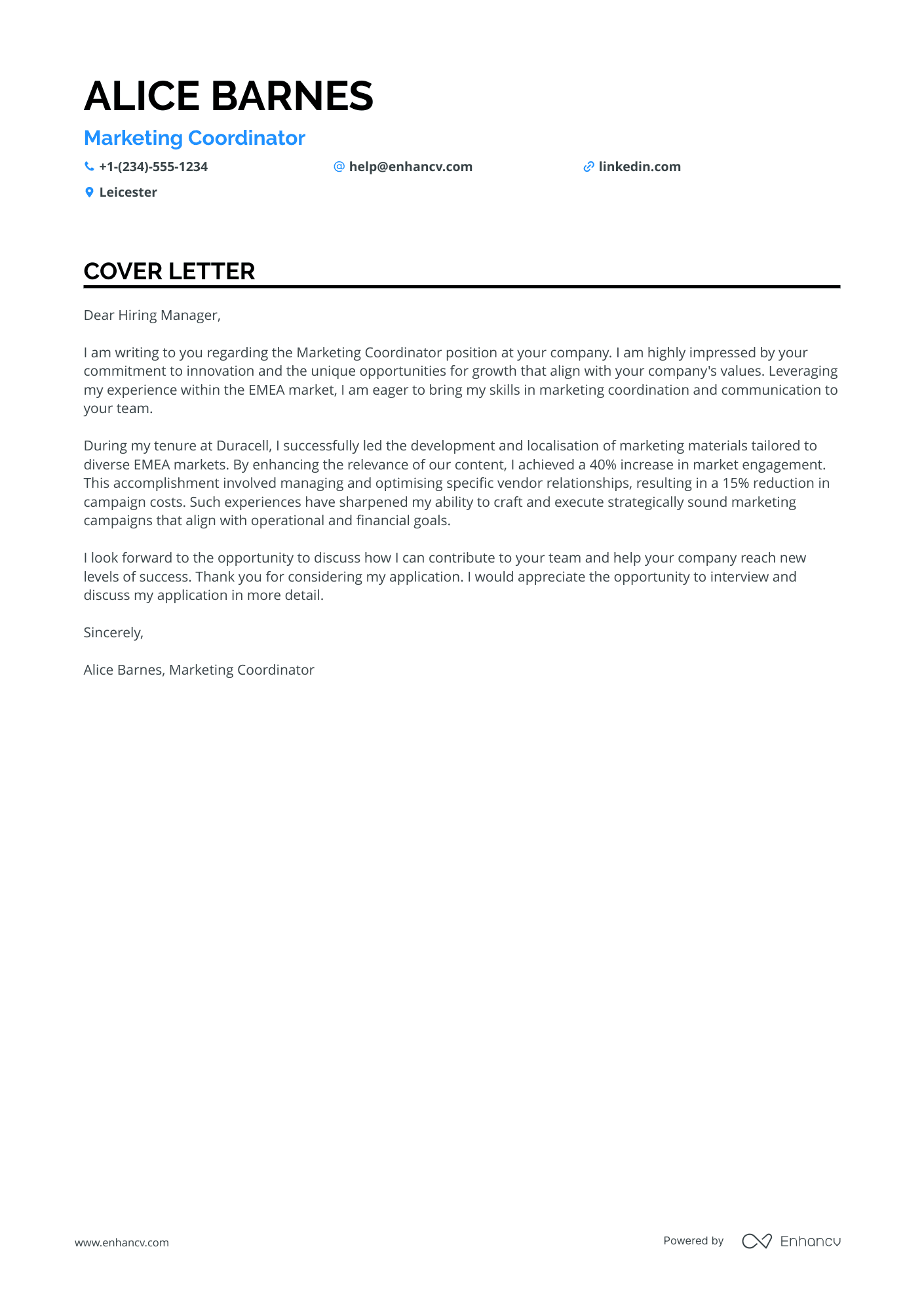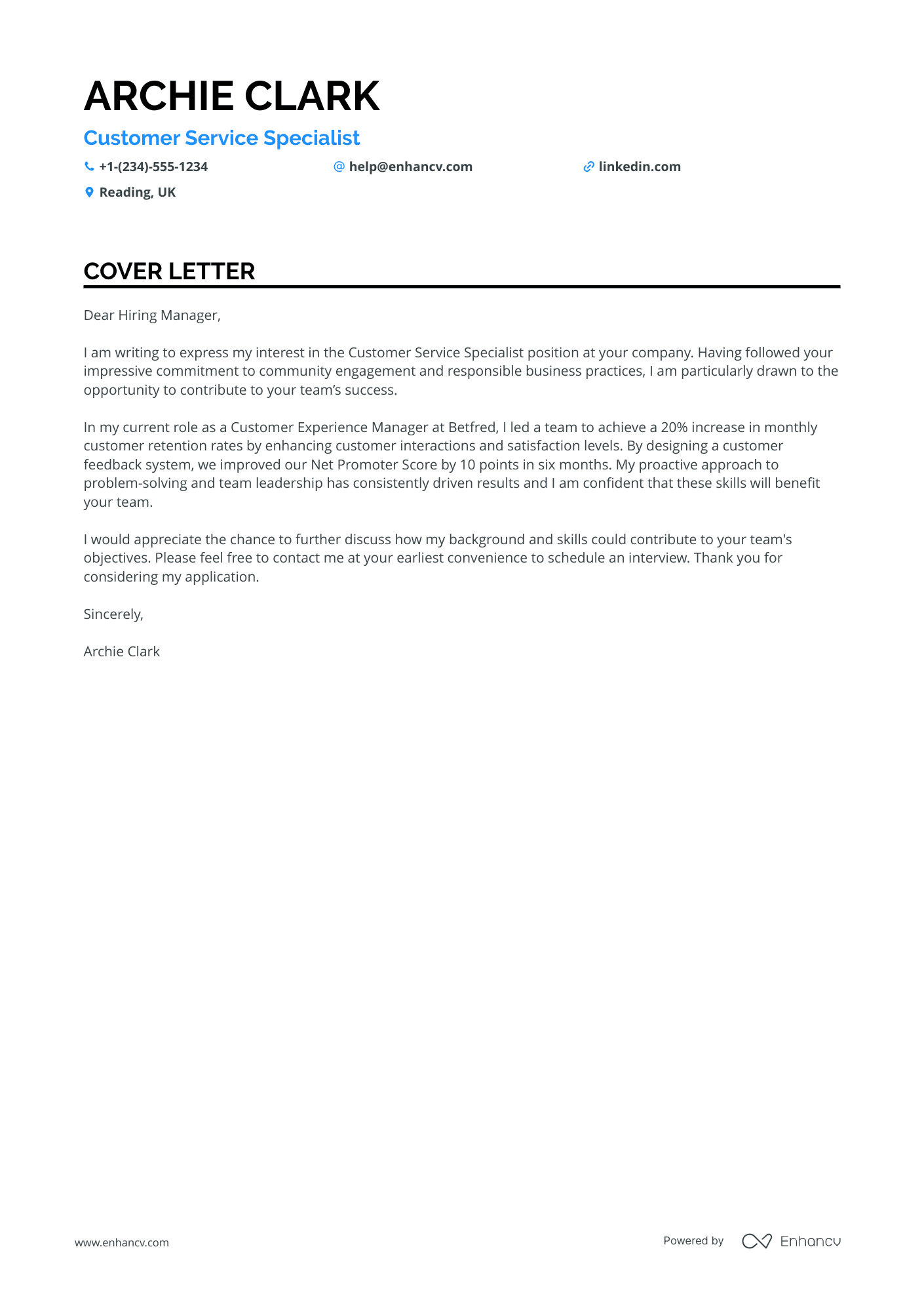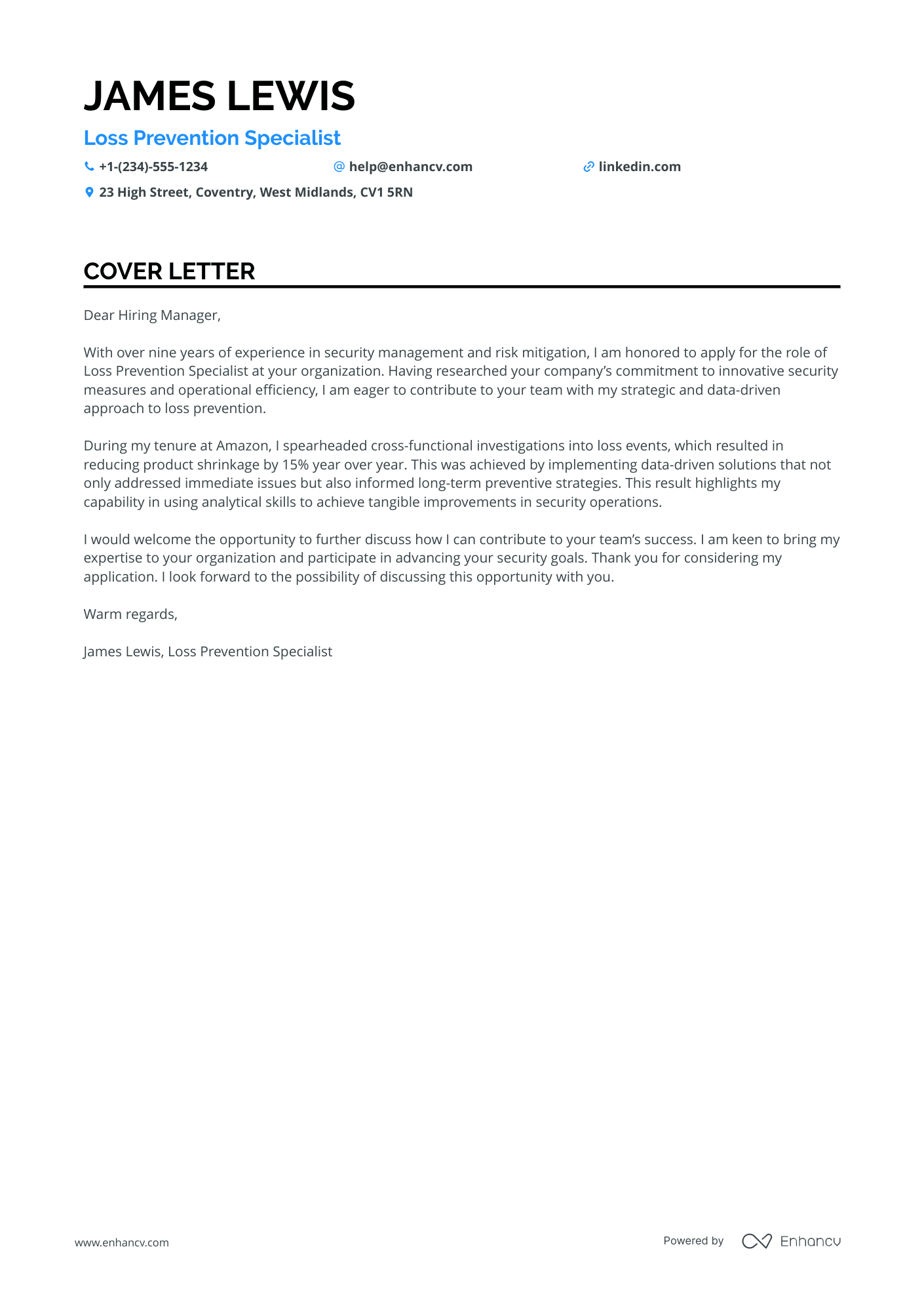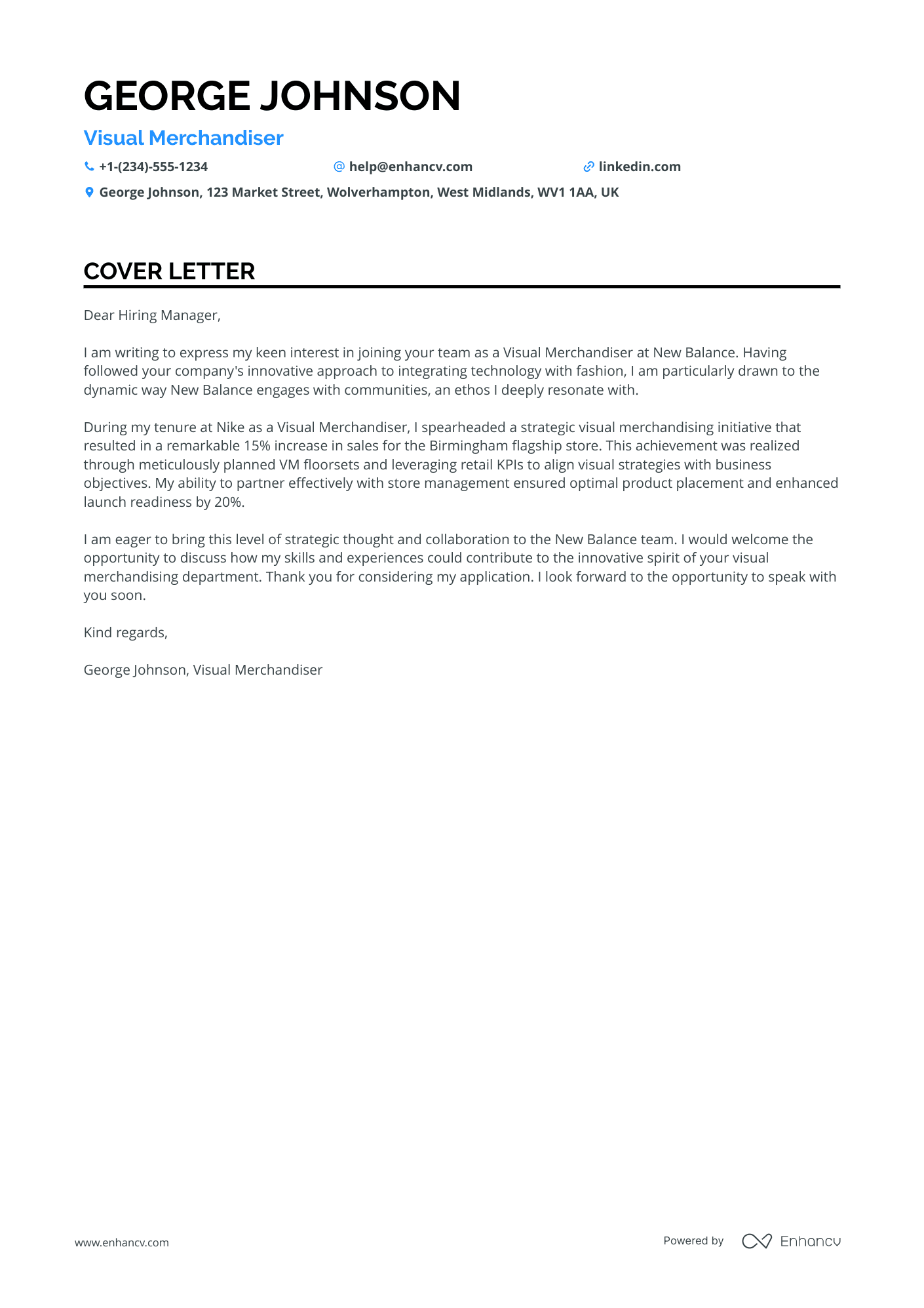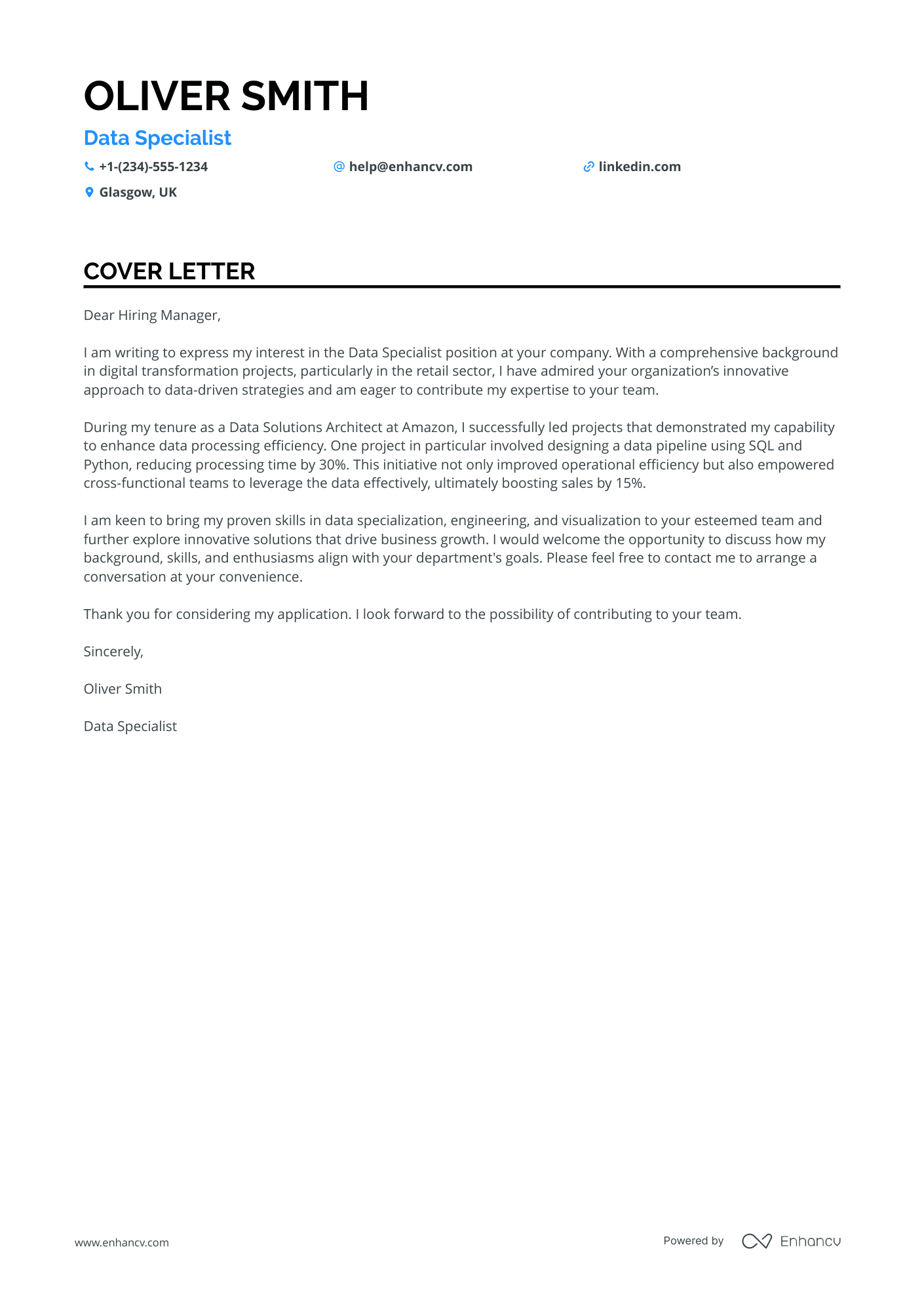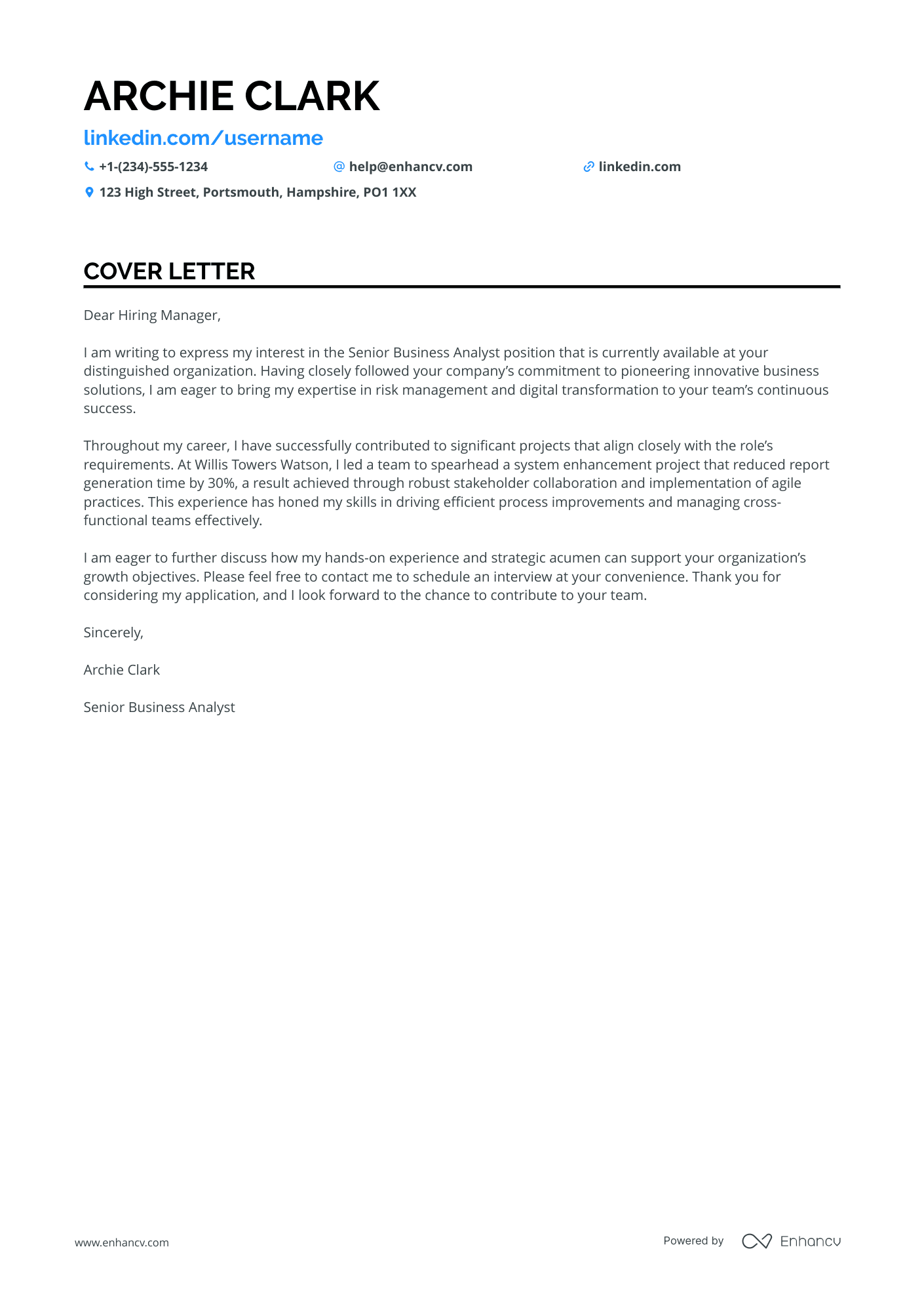Congratulations on completing your first cover letter. However, as you look back, you realise it’s simply a copy-paste of your CV.
Repeating your curriculum vitae is a common pitfall that many candidates encounter, making the cover letter redundant.
Your cover letter should provide fresh insights, adding more value to your application. It’s also the ideal space to address career gaps or major transitions that might not be covered in your CV.
In this guide, you’ll learn how to use your cover letter to demonstrate why you’re the best candidate for the role, while confidently addressing your career history and key achievements.
Cover letter examples for retail
By Experience
Entry-Level Retail Sales Associate
- Highlighting Specific Achievements: The cover letter effectively showcases specific achievements such as a 30% increase in store sales and a 15% reduction in operating costs, demonstrating proven success and impact in previous roles.
- Relevant Certifications and Training: By including certifications like the Retail Management Certification and Effective Leadership in Sales, the letter underscores specialised knowledge and dedication to professional growth, which are valuable in a retail management role.
- Skills Emphasised: Core skills such as sales strategy, customer experience, and team leadership are clearly outlined, aligning with the primary responsibilities of the role and highlighting the applicant's capability.
- Language Proficiency: Mentioning proficiency in both English and Spanish could be advantageous for roles in diverse environments or with international customers, potentially serving as a differentiator.
Senior Retail Store Manager
- Leadership and Team Development: The cover letter effectively highlights the candidate's experience in leading larger teams, such as at Nike, and stresses significant outcomes in team growth and performance.
- Focus on Customer Experience: It showcases initiatives that led to a marked improvement in customer satisfaction scores, indicating a deep understanding of customer-centric strategies which is crucial in retail.
- Measurable Achievements: The candidate details specific percentage increases in revenue, productivity, and customer engagement, providing concrete evidence of their impact, highly effective in catching the attention of potential employers.
- Brand Storytelling and Marketing Skills: The cover letter discusses the implementation of visual merchandising strategies and community engagement events, reflecting the candidate's ability to connect with consumers and enhance brand loyalty.
Junior Retail Buyer
- Emphasise relevant certifications, such as the "Advanced Negotiation Skills" certification from CIPS, which directly enhances abilities critical to roles in procurement and supplier management.
- Highlight specific achievements, like a 15% increase in profit margins, which showcase the candidate's direct impact on financial performance and demonstrate successful application of business skills.
- Underscore leadership roles and mentorship experiences, such as training new team members, to illustrate soft skills that are imperative for teamwork and leadership in business settings.
Experienced Retail Pharmacist
- Highlight Relevant Certifications: The cover letter effectively emphasises the importance of certifications such as Immunisation and Vaccine Certification which is crucial for pharmacists involved in immunisation clinics and vaccine administration.
- Showcase Experience in Patient Care: The cover letter underlines achievements in improving health outcomes and customer satisfaction, which are critical for pharmacists focused on patient care in independent pharmacies.
- Emphasise Operational Expertise: The letter demonstrates the applicant's capacity to manage pharmacy operations efficiently, including inventory management and prescription accuracy, which are key skills for this role.
- Detail Leadership and Training Initiatives: It highlights the applicant's success in training and leading teams, which is especially valuable in independent pharmacy settings where team efficiency and collaboration are vital.
Advanced Retail Marketing Coordinator
- Emphasising quantitative achievements, such as the 45% increase in user engagement, helps demonstrate the tangible impact of the candidate's digital marketing strategies and is essential for roles focused on analytics and performance.
- Highlighting specific technical skills, such as proficiency in Excel and strategic data analysis, underlines the candidate's capability to handle complex data, which is crucial for success in digital marketing roles that require analytical aptitude.
- Incorporating educational background, such as an MBA from the University of Liverpool, alongside industry-related courses like 'Advanced Digital Marketing' and 'Data-Driven Marketing', showcases a combination of formal education and specialised learning pivotal for a comprehensive understanding of the field.
- Mentioning leadership experience, such as managing cross-functional teams and leading stakeholder presentations, reinforces the candidate's ability to drive initiatives and influence decision-making processes, which are valuable traits in senior digital marketing positions.
By Role
Retail Sales Associate
- Highlight specific achievements, such as percentage increases in sales or customer satisfaction scores, to demonstrate the impact and success in previous roles.
- Emphasise relevant experience in luxury retail and visual merchandising, which plays a critical role in enhancing brand image for high-end retail positions.
- Mention any advanced certifications or courses, like the Luxury Brand Management Certificate, to showcase specialised knowledge and commitment to the luxury fashion sector.
- Include leadership experiences, such as leading training sessions or coordinating projects, to illustrate capabilities in team development and effective management.
Retail Buyer
- Highlighting Certifications: Mentioning relevant certifications, such as the Strategic Retail Management Certification and Advanced Negotiation Skills Workshop, adds credibility and showcases specialised knowledge in retail strategies and supplier negotiations.
- Emphasising Key Achievements: Including concrete achievements, such as increasing sales by 25% at Sports Direct and enhancing margins by 12% at JD Sports, demonstrates the candidate's ability to drive tangible business results.
- Showcasing Relevant Experience: Detailing specific roles and responsibilities, like leading cross-functional teams and managing the product lifecycle, illustrates a comprehensive understanding of retail buying and merchandise development.
- Presenting Industry-Specific Passions: Highlighting passions in creative product development and football culture aligns personal interests with professional roles, making the candidate relatable and engaged with the sector.
Retail Merchandiser
- Quantifiable Achievements: Highlighting a 45% increase in product visibility and a 20% boost in sales demonstrates tangible success in the retail merchandising domain, which is valuable to potential employers.
- Industry-Relevant Experience: Focusing on roles directly related to the desired position, such as Retail Merchandiser and Visual Merchandiser, establishes credibility and proficiency in the field.
- Key Skills and Tools: Emphasising the use of company-issued tablets for real-time reporting and planogram implementation showcases technical competency in tools relevant to merchandising.
- Strong Customer Engagement: Illustrating increased foot traffic and customer time spent in stores highlights the ability to create enticing and effective retail environments that attract and retain customers.
Retail Pharmacist
- Highlighting Relevant Experience: Clearly enumerate achievements and responsibilities that showcase the applicant’s ability to increase profitability and customer satisfaction, such as improving medication adherence rates and increasing store profitability by applying strategic operational practices.
- Emphasising Leadership Skills: Point out experiences where leadership resulted in tangible improvements, such as coaching pharmacy trainees who then secured full-time positions and leading a team to achieve high customer satisfaction ratings.
- Specialised Skills and Compliance: Incorporate specific certifications and compliance knowledge, like GPhC compliance measures and NHS service plans, demonstrating the candidate's expertise in maintaining high standards of care and operational excellence.
- Showcasing Achievements with Data: Use quantifiable data to illustrate achievements, such as boosting sales by a definitive percentage, reducing sourcing costs, or improving audit scores, which adds credibility and impact to the cover letter.
Retail Marketing Coordinator
- Highlight Relevant Experience: Alice Barnes effectively showcases her extensive experience in marketing roles across well-known companies, emphasising her growth from Marketing Executive to Marketing Coordinator.
- Quantifiable Achievements: Alice includes measurable outcomes, such as a "30% boost in international campaign engagement," to clearly demonstrate the impact of her work.
- Key Skills and Tools: Specific mention of platforms and tools like Adobe Creative Suite, Microsoft Office, and Monday.com underscores her technical proficiency, which is crucial for marketing roles that require project management and digital marketing skills.
- Education and Continuous Learning: By listing a Master's in Business Administration and relevant courses, Alice conveys her commitment to continuous learning and a strong theoretical foundation in marketing and business.
Retail Customer Service Representative
- Highlight certifications that are essential for the role, such as the "Responsible Gambling Awareness Certification" which could underscore specialised knowledge in promoting responsible gambling.
- Emphasise achievements that demonstrate key contributions to the company's goals, like the "Customer Retention Champion" award which showcases the ability to nurture ongoing customer relationships.
- Illustrate a track record of leadership and innovation by referencing the development and implementation of training programmes, such as the one that improved team efficiency by 35%.
- Demonstrate a passion for community engagement by noting past initiatives that successfully elevated store footfall and strengthened local partnerships, indicating a commitment to community involvement.
Retail Loss Prevention Specialist
- Relevant Experience: The cover letter effectively highlights a wealth of experience in loss prevention, security management, and risk mitigation, which are key components for the role.
- Quantifiable Achievements: Specific achievements, such as reducing product shrinkage by 15% and improving compliance by 25%, are quantified to demonstrate impact and effectiveness in past roles.
- Certifications and Courses: Highlighting the Certified Information Security Manager (CISM) certification and advanced security management training underscores the candidate's commitment to industry best practices and continuous learning.
- Cross-Functional Skills: The candidate's ability to lead cross-functional investigations and collaborate effectively with various teams is showcased, which is crucial for a role that involves liaison and teamwork.
Retail Visual Merchandiser
- Highlight experience in executing VM strategies and delivering quantifiable results such as increased sales by 15% at Nike to demonstrate effectiveness and proficiency in the role.
- Emphasise teamwork and collaboration skills, such as partnering with store management and training team members, to showcase ability to work well in a team-oriented retail environment.
- Incorporate specific achievements like improving launch readiness and compliance rate, to display a track record of successfully meeting and exceeding set targets and objectives.
- Include relevant educational background, such as a Master’s degree in Fashion Retail Management and courses in Visual Merchandising techniques, to underline formal training and expertise in the field.
Retail E-commerce Specialist
- Highlighting Relevant Certifications: The cover letter effectively highlights key certifications like "Advanced SQL for Data Analysis" and "Data Engineering on Google Cloud", which are crucial for a Data Specialist role.
- Emphasising Proven Success: Specific achievements such as reducing data processing time by 30% and enhancing sales by 15% demonstrate Oliver's ability to deliver impactful results, making them an attractive candidate.
- Showcasing Versatility in Skills: The cover letter underscores proficiency in various technical skills like SQL, Python, and data visualisation, which are essential for supporting digital transformation initiatives.
- Addressing Industry Experience: Mentioning experience with well-known companies like Amazon and Tesco adds credibility and showcases industry-specific expertise in data solutions and analytics.
Retail Business Analyst
- Emphasise relevant certifications such as the Certified Business Analysis Professional (CBAP) and Agile Project Management Practitioner to showcase advanced skills crucial for a Senior Business Analyst role.
- Highlight significant achievements such as streamlining client onboarding and digital transformation leadership, which demonstrate the ability to drive impactful changes and improvements in business processes.
- Incorporate key industry skills such as stakeholder management, agile methodologies, and regulatory compliance to underscore the expertise required for a role in risk management and process improvement.
- Include a proven track record in successful projects such as reducing non-compliance incidents and enhancing reporting efficiency to illustrate hands-on experience and results-driven capabilities.
Retail cover letter example
James Lewis
James Lewis Edinburgh Scotland EH1 1AA
+44 1234 567890
help@enhancv.com
- Emphasize Strategic Initiatives: Highlight your experience in developing and implementing successful business strategies that led to measurable growth, such as a significant increase in sales.
- Quantify Achievements: Use specific numbers or percentages to quantify your accomplishments, as this helps demonstrate the impact of your contributions.
- Align with Company Goals: Reference specific aspects of the company's mission or goals, such as their commitment to embracing cutting-edge technologies, to show how your experience aligns with their needs.
- Demonstrate Industry Expertise: Discuss relevant industry experience that aligns with the position, such as leading licensing initiatives or successful channel strategy overhauls.
Importance of cover letters in the United Kingdom
Cover letters are a crucial part of your application, offering additional details beyond your CV.
Here’s why they’re essential:
- Supporting your CV: Now's your opportunity to provide some context for your experience, with more information on your key achievements and how your profile could benefit the position and organisation to which you're applying.
- Showcases your character: Taking the time to write a cover letter demonstrates that you’re proactive, organised, ambitious, and genuinely interested in the role.
- Reflects your career goals: Use the cover letter to outline your long-term career career aspirations and how this role aligns with your broader plans.
What UK employers expect from a cover letter
You only have one chance to impress your potential UK employers, so be wise about writing your cover letter.
When doing so, follow these three simple but essential steps:
- Do your research: Begin by researching the company and the role you're applying for. Check their website, social media pages, and relevant news to understand what drives their business.
- Highlight company values: Identify the company's core beliefs and explain how your personal and professional experiences resonate with them. For instance, if the organisation prioritises innovation, provide examples where you've demonstrated creative thinking.
- Match your skills to the job: Analyse the job description carefully and pick out the most important skills or qualifications they’re seeking. Be sure to mention your relevant achievements that prove you're the perfect fit for the position.
How to format a retail cover letter
Before diving into the content, the structure of your cover letter should include the following elements:
- Your address and contact details
- The employer’s name and address
- Date
- Salutation or greeting
- Opening or introductory paragraph
- Middle or body paragraphs
- Closing paragraph
- Sign-off and signature
When it comes to the best font choice, consider modern options like Lato, Rubik, Raleway, Volkhov, Chivo, or Bitter as alternatives to Arial or Times New Roman.
Your cover letter should be single-spaced, with approximately 1-inch (2.5 cm) margins all around (our templates are set up automatically with this spacing in mind).
Ensure your CV and cover letter use the same font for consistency, and always send them as a PDF to prevent edits and maintian formatting.
Lastly, while Applicant Tracking Systems (ATS—the software used to match your application to set requirements) won't read your cover letter, recruiters certainly will, so make sure it stands out.
How to write your retail cover letter salutation
In a world of AI and instant prompts, taking the extra time to personalise your cover letter truly makes a difference.
Address the hiring manager directly with a customised greeting (e.g., 'Dear Mr Bond', 'Dear Ms Penny').
You can often find their name on LinkedIn (under the job listing or by searching) or in the ‘About’ or ‘Meet the Team’ section of the company's website. If in doubt, you can also contact the reception for assistance.
If you can't find the name, rather than using 'Dear Sir or Madam', opt for something more personal, such as 'Dear [Company Name] Hiring Manager'.
How to write your retail cover letter intro
One of the best ways to grab a hiring manager's attention? Show them the unique value you'd add to the team.
Review the skills or requirements listed in the posting and draw connections to your previous work experiences.
Focus on specific (and quantifiable) accomplishments and qualifications that align with the job description to make a strong first impression.
How to write your retail cover letter body
You’ve personalised your greeting and introduction—now it’s time to focus on writing the body of your cover letter.
Instead of listing off skills and responsibilities from your CV, focus on one career highlight that’s relevant to the role.
Use your hard and soft skills, success metrics (e.g., percentages or sales figures), and the long-term impact it had on the company.
A concise, well-told story centred on your value as a candidate will make a strong impression.
How to write a closing paragraph
Now we’ve reached the closing paragraph of your cover letter. You might be tempted to end with a simple Yours sincerely, but don’t!
Instead, finish with a promise to enhance the company’s performance metrics (backed by your hard and soft skills), to develop as a professional, or something else that holds significance for the organisation. Whatever you choose, ensure to stand behind your words and be remain sincere.
Don’t forget to include a call to action, encouraging recruiters to suggest the best time to follow up for an interview or update.
Conclusion
A well-crafted cover letter can significantly enhance your job application and set you apart from other candidates. Begin by personalising your message to the hiring manager and connecting your experiences to the company's values.
Emphasise your key accomplishments that reflect your skills and passion for the role, while maintaining a professional tone throughout. Ensure that your cover letter and CV present a unified and polished image to maximise your chances of success.
